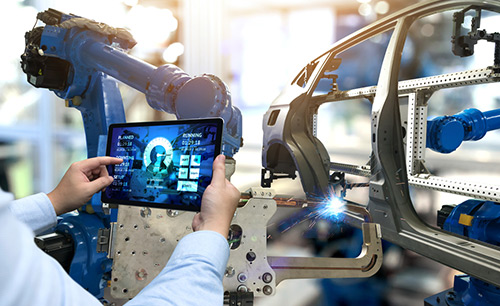
Present meets future - Who benefits from the new era of corporate and production processes?
More and more automobile manufacturers are adapting their production processes - from assembly line production to modular assembly. Audi already switched the production of their R8 models to modular assembly back in 2016. Driverless transport systems move the car under construction from one workstation to the next. This new way of production is driven primarily by the ever-increasing individuality of vehicles, the origin of which lies in the umpteen variants of vehicle configuration when a car is purchased. It has thus become extremely rare that there are even two completely identical vehicles on an assembly line.
Productivity despite individuality
Classic assembly line production can therefore quickly reach its limits. Vehicles have to pass certain production stations for varying lengths of time. This is at the expense of productivity. Particularly for upper mid-range and luxury class vehicles, it is consequently worthwhile switching production to modular manufacturing. The more complex the vehicle is and the greater the variance, the sooner it makes sense to switch the production process. The move to modular assembly is also fueled by the increase in production of electric cars.
Industry 4.0 becomes tangible
Mercedes will open Factory 56 in Sindelfingen this September, one of the most modern automobile production facilities in the world. Production will be flexible and modular and driverless transport systems will also be used at the hands of 5G. 5G, the latest standard for mobile internet, is available for a production area of more than 20,000 square meters so that the most modern technologies can be used and run smoothly. Employees are also integrated into the processes more flexibly and individually. This makes it possible to better account individual employees during planning, with regard to shift operation and personnel composition.
It is often the case that applications and systems in the automotive industry serve as pioneers for new or alternative forms of production or process sequences for other industrial branches. It is therefore conceivable that the new form of production not only has an influence on the supplier landscape for production systems, machines, and factory equipment for so-called smart factories. What potential is hidden behind this increasing conversion of production and business processes and for which market players are there market or sales opportunities?
A market for all?
There is an increasing demand for networking solutions between production and logistics, which is of great benefit to suppliers such as Bosch. In 2019 alone, Bosch recorded sales of around three-quarters of a billion euros with networking solutions for production and logistics. This corresponds to sales growth of 25 percent from the previous year (2018). Networking solutions of this kind represent enormous potential, but not only for large corporations such as Bosch. Many SMEs are also entering a promising market with a specialization in this area. The promising aspect is that it is not just about pure capital goods, which are a necessity for production. With intelligent networking, costs can rather be saved across all operating levels, since processes can be optimized and adapted without planning effort.
The future is already being written today
However, there is much more to this topic than just good advice. If you want to remain competitive in the future and retain or expand your customer base, there is no way around networking. This market opens up opportunities for equipment manufacturers, mechanical and plant engineering companies, including robot technology and driverless transport systems, planning offices, security, software and communication companies, as well as IT and consulting firms.
With the requirements and questions that are being triggered by the industry 4.0 topic, the possibilities and opportunities that almost every industry is confronted with are also growing. This development will continue precisely because the impending turnaround is more than just a mere networking of production and logistics. Industry 4.0 aims to ensure that raw materials or workpieces are no longer controlled top-down, but rather carry and communicate the necessary information themselves. This is essential for the entire value chain of a product.
Even if this scenario may sound like a mere dream of the future for some people, the developments are already noticeable, and the market dynamics are increasing abruptly. The times in which one increases output and "only" manages more efficiently will be replaced by more flexible, individual and communicative corporate and production processes.
If you want to know how your products can benefit from the developments of Industry 4.0, need support in analyzing global markets, or are planning a market entry or market development strategy, please contact us. We will be happy to discuss with you the possibilities and research designs that will enable you to optimally align yourself with the future markets of this world.